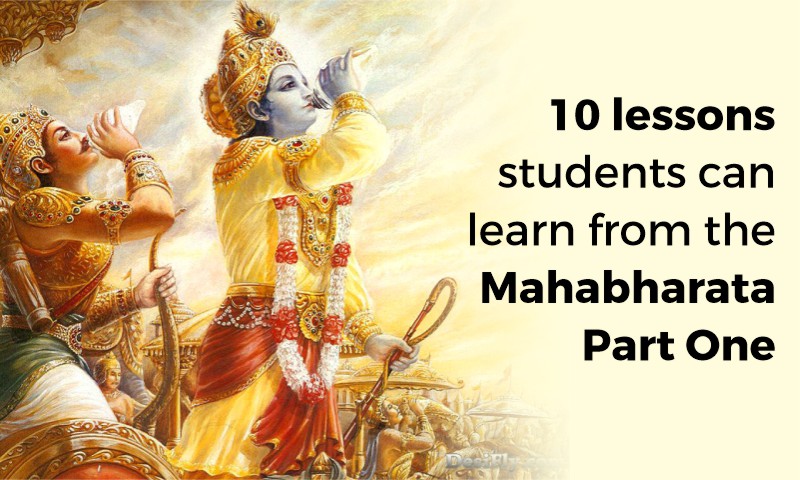One of the greatest stories every told, the Epic Mahabharata, has many lessons for every kind of person from every walk of life. For students, the story presents a stunning treasure trove of analogies, morals and life-changing takeaways to improve their studies, be clearer on their goals and find the right guidance to succeed in their journey.
Here are a few key takeaways for students from the Mahabharata:

1. Be an ever-learner
Take the example of Arjun in Mahabharata. He was always eager and ready to learn. He learnt the best of military science from Dronacharya, the art of using divine weapons from Indra and about Pashupatastra from Mahadev. Not just this, he treated Yudhishthir and Krishna as his mentors as well and continued to learn from them whenever they had anything to offer.
Every student should aim to be like Arjun. In fact, it is the duty of every student to make learning a continuous process. In today’s work culture, society and employers reward those who are always learning to improve.
2. Live What You Learn
Students read a lot of material but seldom apply it beyond exams. For example, in social science class or moral science class, one gets to learn how to behave, how to conduct oneself and interact with one’s peers. Acts of kindness, gratitude and compassion are things you might learn from multiple sources at school. Unfortunately, this knowledge remains limited to writing in exams and not beyond that because you don’t think about it beyond school. Real progress happens when we apply what we learn in our daily lives. In the Mahabharata, Krishna revealed the truths of life through the Gita to Arjuna and that is when he learns about the true nature of this world.
3. Always believe in yourself
When Guru Dronacharya denied Eklavya the honour of accepting him as a student, Eklavya did not lose his spirit and neither his desire to learn archery. Instead he took the soil trodden by Dronacharya and sculpted a symbolic statue out it. In time, through sheer determination and belief, Eklavya became his No. 1 disciple. He was so good that the Guru had to ask him to cut off his thumb so that Arjun could become the best instead.
Without outside help or any extra coaching, Eklavya became the best because he was passionate about it. His motivation to learn was internal, Dronacharya was merely a medium. If you believe in yourself and have the will to learn consistently, you can score top rank not just in your class but even at a national level.
4. Choose what is right, not what is pleasurable.
In these days of social media and pleasant distractions, it is easy to get lost and lose yourself in momentary pleasures. With a click you can spend hours scrolling through social media when you should have been studying, or practicing something else. Distractions like social media and games are challenges that students face every day. The Mahabharata teaches us that even thought the problems seem insurmountable one has to go ahead and tackle them anyway if one wishes to accomplish one’s goals. So, if you want to rank higher in your class or clear that competitive exam, put the phone on silent immediately and start studying. In the epic, Arjuna wanted to put down his weapons and leave the war because he was not willing to slay his kin. It was only after Krishna explained the correct reasons to fight and motivated him, he agreed to go to war against his brothers, the Kauravas.
5. Practice makes perfect
Take the example of Eklavya and Dronacharya again. Through no formal training and only with a strong desire to learn, Eklavya trained to become better than the best. It was countless of hours of practice that made him the best archer around. Had he remained under instruction, he probably would not have become the Eklavya we know.
This is an important point for those who are appearing for competitive exams. It is a common problem seen with students that they neglect practicing mock tests and only focus on gaining more knowledge which results in them scoring less. Even with a teacher, only through practice can one become proficient.


 Useful for all Parents/Teachers
Useful for all Parents/Teachers 






